|
|
|
Sort Order |
|
|
|
Items / Page
|
|
|
|
|
|
|
| Srl | Item |
| 1 |
ID:
130959
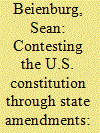

|
|
|
|
|
| Summary/Abstract |
IN MARCH OF 2013, REPUBLICAN LEGISLATORS in North Dakota agreed to challenge Roe v. Wade by forwarding a "personhood" amendment to voters that will appear on the 2014 ballot. Such an amendment would change the state's legal definition of personhood to include unborn fetuses-a move that backers have explicitly discussed as part of a challenge to a Supreme Court decision they view as having been wrongly decided.1 The Court may pronounce itself the final arbiter of the Constitution, but Americans outside of Washington, DC do not necessarily agree.2
Such efforts by state actors to take the Constitution away from the courts mirror a recent shift in political-legal scholarship, in which court-centered accounts of constitutional interpretation and construction have been rightly condemned.3 Scholars have turned instead toward a renewed emphasis on the political contestation of non-judicial actors in enforcing the Constitution.4
|
|
|
|
|
|
|
|
|
|
|
|
|
|
|
|
| 2 |
ID:
130960
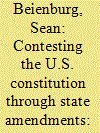

|
|
|
|
|
| Summary/Abstract |
IN MARCH OF 2013, REPUBLICAN LEGISLATORS in North Dakota agreed to challenge Roe v. Wade by forwarding a "personhood" amendment to voters that will appear on the 2014 ballot. Such an amendment would change the state's legal definition of personhood to include unborn fetuses-a move that backers have explicitly discussed as part of a challenge to a Supreme Court decision they view as having been wrongly decided.1 The Court may pronounce itself the final arbiter of the Constitution, but Americans outside of Washington, DC do not necessarily agree.2
Such efforts by state actors to take the Constitution away from the courts mirror a recent shift in political-legal scholarship, in which court-centered accounts of constitutional interpretation and construction have been rightly condemned.3 Scholars have turned instead toward a renewed emphasis on the political contestation of non-judicial actors in enforcing the Constitution
|
|
|
|
|
|
|
|
|
|
|
|
|
|
|
|
| 3 |
ID:
130962
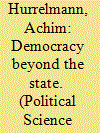

|
|
|
|
|
| Publication |
2014.
|
| Summary/Abstract |
MODERN DEMOCRACY IS, ABOVE ALL ELSE, a procedural ideal. To be sure, high substantive hopes are often placed in democracy. Yet the essence of democracy lies not in the specific outcomes that it may (or may not) help reach, but in a set of procedures that ensure, in the words of Philippe Schmitter and Terry Karl, that "rulers are held accountable for their actions in the public realm by citizens," who act primarily "through the competition and cooperation of their elected representatives."1 Historically, the main political arena in which democratic procedures have been implemented, and the main reference point for democratic theory, has been the state. According to a well-established argument, the democratization of non-state entities-such as international and supranational organizations or transnational networks with various degrees of institutionalization-is therefore faced with significant conceptual and practical challenges.2 This article seeks to assess the severity of these challenges: Can democratic procedures be transferred to political entities "beyond the state," or is democracy doomed to failure in non-state contexts?
|
|
|
|
|
|
|
|
|
|
|
|
|
|
|
|
| 4 |
ID:
130958
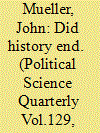

|
|
|
|
|
| Publication |
2014.
|
| Summary/Abstract |
IN A 1989 ESSAY, FRANCIS FUKUYAMA ADVANCED the notion that, with the death of communism, history had come to an end.1 This somewhat fanciful, and presumably intentionally provocative, formulation was derived from Hegel, and it has generally been misinterpreted. He did not mean that things would stop happening-obviously a preposterous proposal.2 Rather, he contended that there had been a profound ideological development. With the demise of communism, its chief remaining challenger after the extinguishment earlier in the century of monarchy and Fascism, liberalism-democracy and market capitalism-had triumphed over all other governmental and economic systems or sets of ordering principles. Looking for future challenges to this triumph, he examined the potential rise of destructive forms of nationalism and of fundamentalist religion, but found them unlikely to prevail. Thus, the triumph of liberalism was likely to be permanent.
This article evaluates developments over the subsequent quarter century and argues that Fukuyama seems to have had it fundamentally right. Beginning with the countries of Eastern Europe, democracy continued its progress after 1989. Moreover, capitalism increasingly came to be accepted, so that when the world plunged into widespread economic crisis after 2007, proposed remedies variously recommended tinkering with the system, not abandoning it.
In the meantime, violent forms of nationalism that surged in some places in the last decade of the old century scarcely proved to be much of a challenge to these trends, and the same seems likely to hold for violent forms of fundamentalist religion that surged in some places in the first decade of the new one. In fact, the significance of both of these illiberal developments seems to have been much exaggerated.
In addition, there was a striking decline of civil warfare during the decade after 1989 to low levels that have held now throughout the new century.
|
|
|
|
|
|
|
|
|
|
|
|
|
|
|
|
| 5 |
ID:
130963
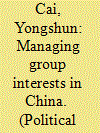

|
|
|
|
|
| Publication |
2014.
|
| Summary/Abstract |
Monopolistic Industries IN CHINA have been criticized heavily in recent years for their unrestrained pursuit of interests at the expense of the public or other parties.1 Such criticisms are not unfounded, as exemplified by the Chinese oil industry. In China, the China National Petroleum Corporation and the China Petroleum and Chemical Corporation, together with the China National Offshore Oil Corporation, have monopolized the oil supply in the country.2 In 2006, China had approximately 660 privately owned oil wholesale enterprises and 45,060 privately owned gas stations. However, by early 2008, two thirds of the wholesale enterprises and one third of the gas stations were closed, and another 10,000 gas stations lost money. This situation was a result of a monopoly of the oil industry by state-owned companies. When oil prices were high, the China National Petroleum Corporation and China Petroleum and Chemical Corporation refused to provide oil to privately owned companies. The national government agencies repeatedly urged the two companies to provide oil to private businesses. The premier and vice premiers also gave 14 instructions to require them to provide oil. But all of these were largely ignored by the two companies
|
|
|
|
|
|
|
|
|
|
|
|
|
|
|
|
| 6 |
ID:
130957


|
|
|
|
|
| Publication |
2014.
|
| Summary/Abstract |
America's Employment of Weaponized Unmanned Aerial Vehicles (Uavs), Popularly Known as "drones," to kill alleged terrorists in Pakistan's federally administered tribal areas (FATA) fuels sustained controversy in Pakistan. Pakistani outrage has steadily deepened since 2008, when the United States increased the frequency of the strikes.1 The increasing use of "signature strikes" has been particularly controversial in (and beyond) Pakistan, because such strikes are targeted at "men believed to be militants associated with terrorist groups, but whose identities aren't always known."2 Whereas personality strikes require the operator to develop a high level of certainty about the target's identity and location, based on multiple sources such as "imagery, cell phone intercepts and informants on the ground,"3 operators may "initiate a signature strike after observing certain patterns of behavior."4 When conducting signature strikes, the United States assesses that the individuals in question exhibit behaviors that match a pre-identified "signature" (for example, pattern of observable activities and/or personal networks) that suggests that they are associated with al Qaeda and/or the Pakistani or Afghan Taliban organizations.5 Because the identity of the target is unknown, even during the strike, it is possible that these persons are innocent civilians, a possibility that both current and former U.S. government officials concede.6 While the George W. Bush administration employed both personality strikes from 2004 and signature strikes from 2008 in Pakistan, the administration of Barack Obama has redoubled the use of both types.7 This has ignited public protests against the drones in Pakistan, particularly in Pakistan's urban areas-far removed from the tribal areas where drones are employed. It has also galvanized a vigorous debate within Pakistan's National Assembly, which tried, but ultimately failed, to curtail the strikes
|
|
|
|
|
|
|
|
|
|
|
|
|
|
|
|
|
|
|
|
|